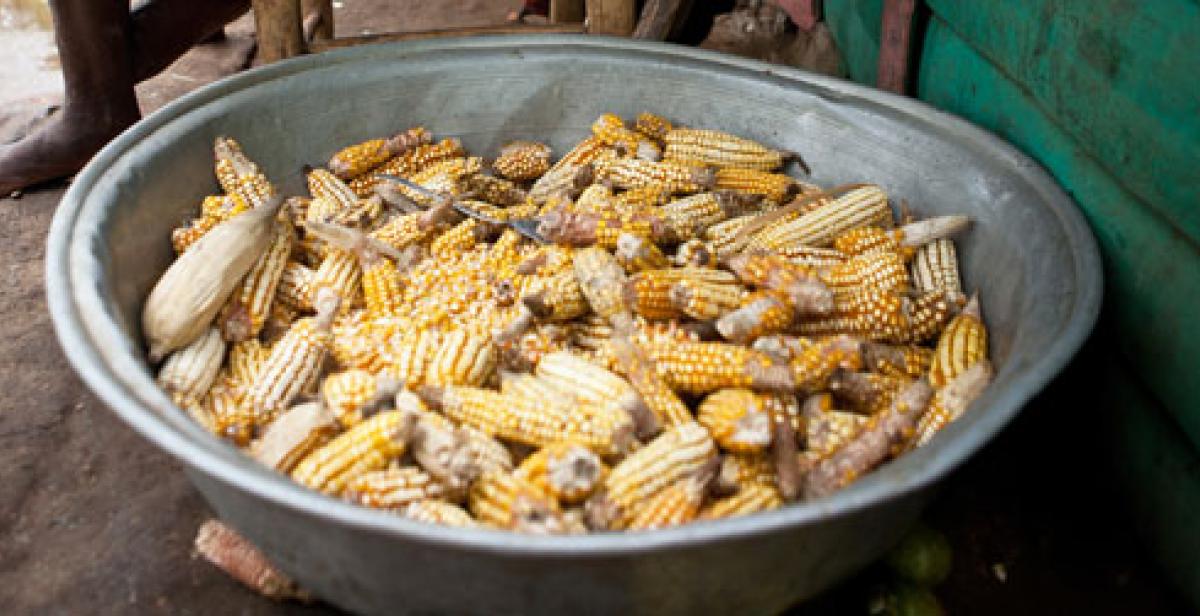This 'Green Week' is a good opportunity to stop and think about the amount of water we consume unconsciously every day. Even if you don’t consider yourself a big tea or coffee drinker you will be consuming hundreds - and probably thousands - of litres of 'virtual water' hidden in the production process of all items of food and of course drink.
Increasing demands on water
In January the Enough Food IF campaign launched, raising awareness about some of the reasons that 1 in 8 people still go to bed hungry every night. But food security is always linked to water security. Lack of access to water for farming is already having a negative impact on food production for many of the world’s poorest people.
So, what can we do about it? Well change, as they say, starts at home. Seeing as red meat is one of the biggest culprits for concealing vast amounts of ‘virtual water’, why not try having a meat free Monday? Just 1kg of beef takes 15,000 litres of water to produce. If you drink a cup of coffee today then that took 130 litres of water to produce; if you’ve eaten a hamburger recently then you ‘consumed’ an additional 2,400 litres of water. Had chips with it? That’s another 276 litres of water that goes into making every 1kg of potatoes.
Let’s get creative with the food in our fridges
Wasted food also means wasted water. It is estimated that one half of all food produced in the world ends up in the bin every year. Whilst the catering industry, supermarkets and fussy shoppers have to shoulder a lot of the blame for this, individual households also make a significant contribution toward food wastage. We need to get creative with the food that’s in our fridge before buying more of it. Checking food rather than it’s sell-by date and recycling leftovers or peelings as compost could make a real difference to the amount of food we waste in the UK.
As Progressio’s waterproof development campaign has emphasised, water is essential to all lives and livelihoods. In poor and marginalised communities access to a sustainable source of water is essential in order to grow food and rear livestock. Our need for food and energy cannot be realised without access to water and the demand for water, energy and food are all set to increase over the coming years. Water is fundamental for survival and we don’t just need it to drink; food and water security are completely intertwined.
What are Progressio doing about it?
Progressio are supporting local people around the world to increase their understanding of efficient and effective water management.
Progressio Development Workers in Haiti and Dominican Republic are supporting local people to grow nutrition gardens, with sustainable crops. Joseph Delfo, a small holder farmer in Lamine, tells us, “We are farmers and we work our plots, but it’s not always easy for us, especially under conditions of extreme rainfall, or extreme sun and drought… We are helped with tools and knowledge so we can adapt better to extreme weather.”
In Yemen Ali Sagheer Sadiq is part of a community being supported by Progressio Development Worker Derek Kim to gain access to a small well and grow kitchen gardens. “The difficulties in accessing fuel resulted in a temporary stop of our water supply because we couldn’t afford the diesel used to pump the water,” Ali says, “This led to the deterioration of our crops so I think the greatest challenge for us is water.” And Ali only gives one answer when asked what he would like to see happen, “I would like more water to expand my kitchen garden.”
As the work with Joseph and Ali shows, sustainable management of the local watershed is critically important. It must involve the participation of members of local communities in consultation with other stakeholders such as businesses and government. In Peru Progressio partner Aquafondo is showcasing how this can be done in a fun and interactive way. Watch a short video about the water management competition local communities participated in.
Water is finite
The bottom line is that water is a finite and shared resource which must be carefully stewarded. Without water, food production will suffer.
So this Green Week why not see if you can complete our water diet challenge? A little thought can go a long way.
Photo shows bowl of maize in the village of Gens de Nantes, Haiti (photo © Fran Afonso/Progressio)



